|
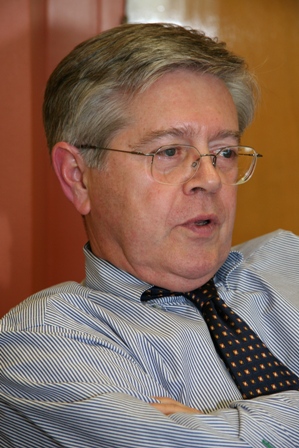 Al:
I would like to know something about your background. Al:
I would like to know something about your background.
Lance: Let's start at the beginning; I was born in Gary, IN in 1940 and
lived there for awhile. We then moved to Aetna, IN and I went to school
in Miller Beach on Lake Street. The building is still there, by the
South Shore tracks. My dad was a watchmaker and jeweler in Gary and
worked with Don Troxell. Then we moved to Johnston City, IL where
my dad grew up. We lived there for three years-long enough for my
dad to go basically bankrupt.
Al: Then what?
Lance: We moved to Pontiac, IL for a short period of time where my
parents had some friends in business. They had been our neighbors
in Aetna. My dad tried to set up business there. He couldn't get
going, so he said, "We are going back to Gary, and I will never
leave Gary again. You can always make money in Gary."
Al: So, you came back to Gary?
Lance: Yes, when I was in the fourth grade, we came back to
northwest Indiana and moved into the little town of Wheeler. That's
where I grew up and that's what I call my hometown. My mother's
family was from there, and I grew up in Wheeler, graduated from
Wheeler HS in 1958, and then I went to Earlham College in Richmond
Indiana. Earlham is a Quaker school where I graduated in 1962.
Al: I know Earlham well; my daughter
graduated from Earlham several years ago. After graduation, what
did you do?
Lance: I went into the Peace Corps. When I was a senior,
President Kennedy
announced the formation of the Peace Corps. I didn't have anything
better to do. So I went into the Peace Corps. I was an English
literature major, and didn't have any great job prospects. I didn't
want to be a teacher, particularly. They sent me to Borneo, the
country of Sarawak actually. When our group got there we were the
first group there. That was in the summer of 1962. In fact, there
weren't that many Peace Corps groups in the world at that time.
However, I did teach school there in Borneo. It was a British Crown
Colony, but shortly after we got there, they were granted
independence. The country of Malaysia was formed, which included
the states of Malaya, Singapore, Sarawak, and North Borneo (now Sabah).
Singapore left that federation a number of years ago and is totally
independent now.
Al: Did you teach English?
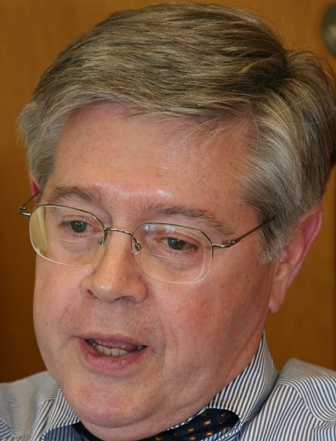
Lance: Yes, I taught English. Being a British colony, all the
public primary schools spoke English. There were Chinese private
schools where they taught in Chinese. The public British primary
school taught in English-at least that was the idea. It was not
totally practiced. When I went to the primary school where I was
assigned, I was the only native English speaker. Most of the people
could speak English pretty well. The locals once in a while tended
to discipline their children and talk to the children in their
native language, which was Malay, the common language there. The
lingua franca in that part of the world-Southeast Asia-is Malay, and
we had to learn some Malay in our Peace Corps training. We were in
training in Hawaii for two months and learned what they called
"bazaar Malay" so you could count money, get food, and use some of
the basic words so that we could converse. However, most everyone
understood English, which was great for me because I don't have a
good language facility. Actually, I don't know if I know English
that well!
Al: After your stint in the Peace
Corps, what did you do?
Lance: I traveled awhile. I spent about a month in Greece looking
at the antiquities and then went to London where I had some British
friends from the Peace Corps. I had been to London before. I had
spent four or five months in Britain while I was at Earlham at the
University of London. After that a friend and I bicycled around
youth hostelling for about six weeks in England, Scotland, and
Wales.
Al: Did you finally come home then?
Lance: Yes, I came back home and went to work at Gary Hobart Water
Company. I had worked there every summer when I was high school and
college. They fortunately hired me. I got back late in the summer
and they let me work the usual 90 days. I earned a little money. I
then decided to go to Arizona then to California to see some other
people that I knew there. On the way out there, my draft notice
showed up at my house in Wheeler. I spent two years in the Army,
one year in Korea, and the last year at Fort Lewis, Washington. My
first daughter, Valerie, was born in Longview, Washington.
Al: What did you do after you got
out of the Army?
Lance: I went to work for a newspaper, because one of the few
things that I could really do well was write a plain English
sentence. I worked for the Longview Daily News for awhile. The
owner, John McClelland, was on the board of the Associated Press,
which was kind of neat. He was well known in the publishing circles
as a good publisher and a pretty aggressive guy. He had a good
newspaper there, I thought. However, we had one daughter at that
point and decided that we were a long way from family. So we
decided to move back to Wheeler, which we did. I worked at The
Daily News for about 1 1/2 years.
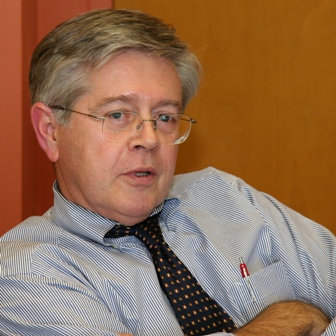 Al: Were you a reporter?
Al: Were you a reporter?
Lance: A staff writer, as we say more properly in the business.
The usual word is reporter. I covered city hall, the police and
fire departments, attended city council meetings, and other boards.
Fortunately, before I left Longview, I was able to arrange a job
with the Gary Post-Tribune and worked there for a couple of years
doing different beats like covering the Gary Police. I was the
editor of a weekly insert called the Porter County Citizen in
Valparaiso, IN. Then I got a little bored. A person I had done a story
about asked me if I wanted to work at the Northwest Indiana Regional
Planning Commission. They needed someone to do newsletters and
other public relations functions. I stayed there for about six
years before coming to Calumet College from 1976-80.
Al: Where did you go after Calumet
College?
Lance: I went to St. Margaret Hospital and worked there for five
years in public relations and development before going to St.
Anthony Medical Center in Crown Point for eight years. From there,
I came back here. I have been here since 1994. Originally, I was
just the Director of Development, but the President wanted to
restructure things. As a consequence, he set up a level of vice
presidents and made me one of them.
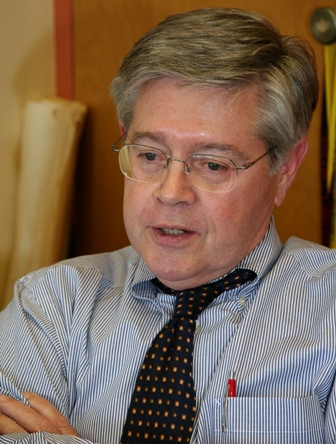 Al: Now that we have this overview
of your work life, I'd like to go back to the Peace Corps and have you
reflect upon its value.
Al: Now that we have this overview
of your work life, I'd like to go back to the Peace Corps and have you
reflect upon its value.
Lance: I really think it is a great program. In fact, I have
actually contemplated going back into it. My wife and I have talked
about that. You get to know other people. It becomes very apparent
very quickly, once you go out into the world and see other people,
that we are pretty much the same everywhere-whether you meet
Chinese, Greeks, Malays, Egyptians, etc. They have the same hopes
and dreams; they want a more comfortable and secure life. They are
interested in what their children are doing, how their children are
faring, and most everyone has the same goals and aspirations. Some
of us are just way luckier than others and happen to be born here in
the US. We have a huge leg up in acquiring what we desire. We
could do a better job of sharing our knowledge and our wealth in
helping other people. I know that it is a huge undertaking. We
could be a little more generous as a nation. When people talk about
how much we give foreign countries, it is really a pittance. It is
almost ridiculous even to suggest that we are doing anything great
out there in the world. There is much more that could be done.
The Peace Corps does that. There is a huge misconception about what
the Peace Corps was about. I think people thought I was going to be
wearing a sarong and living in a grass hut while I was over there.
That is not correct at all. We were middle level technical people
who had some skills to bring to underdeveloped countries, and we
could help them with education, civil engineering, water systems,
healthcare, and a lot of other basic needs. I said I was an English
major, but I didn't have any educational program so I didn't know
really any educational techniques like a typical professional
teacher would learn. But, I was there and spoke English to them
and that was important. It was probably the first time those
children had heard a native speaker at any length.
One of the great pleasures was teaching my 5th grade class. I had
gotten there mid-year and had them the whole next year. I moved up
to the sixth grade with the same kids. At the end of their 6th
year, the students are tested to see where they are educationally.
They have to pass the test to be able to go on to a public
secondary school. It's like the system in Britain. During my first
year, only four or five of the 6th grade kids passed the test out
of a class of 30. The next year, 10 passed the test, and I
was also able to get 4 more into the mission school. They were
really bright kids, but they didn't do well on the test and there
are no takeovers. I thought that was pretty good, and I was very
happy about that. They are great people. The Malays are all Muslim
and they were very friendly and hospitable.
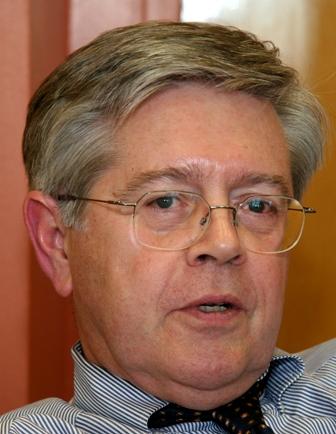 Al:
What were your accommodations like at Sarawak. Al:
What were your accommodations like at Sarawak.
Lance: Of course, the British were very good at keeping things
under control and making themselves comfortable. They built roads,
installed water systems, generated electricity 24 hours a day. We
could drink the water out of the tap, and we had indoor plumbing.
We didn't have hot water, but the water was never very cold anyway
because it was usually 90 degrees there. We had a pretty nice roof
over our heads and a big house in which to live. So we were pretty
well set up, actually. It was almost embarrassingly comfortable
compared to the image that people back home had of what the Peace
Corps volunteers did and how they lived. Of course, we were in a
country that had been a British colony for a long time. That was a
huge advantage. A lot of other Peace Corps volunteers did go to
places that were less developed and civilized than Sarawak.
Al: Where did you get your drive to
help others?
Lance: I don't know; I was never very "churchy." Actually, I still
am not. Certainly Earlham helped me, I guess. It supported that
idea. I don't know what else; I really just enjoyed doing it. I
didn't get this way, though, until after college. I never thought
about it much, but I liked the adventure part. But having been in
the Peace Corps made me feel pretty good. Maybe my concern for
others just of kind of built from there. I haven't had any big
transformation, epiphany, or anything like that that caused some
great conversion. I've never been particularly interested in
money. I mean, I need money. We all need money to take care of
ourselves. I'm also not driven by power. I have a natural
stewardship thing in a personal kind of way.
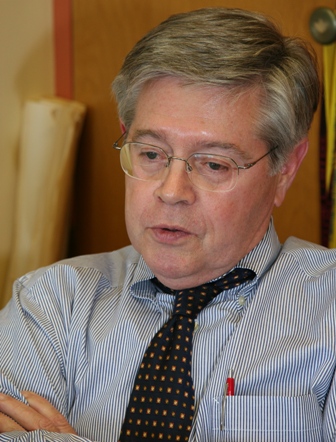 Al: It's interesting that you are so driven toward this outreach without
any great epiphany. Did someone sit you on his lap and say this
is how you are going to run your life?
Al: It's interesting that you are so driven toward this outreach without
any great epiphany. Did someone sit you on his lap and say this
is how you are going to run your life?
Lance: Not that I ever recall. In fact, my dad really wanted me to
go to college. I think he was pretty sure that if I did I would get
a better job and have an easier life than he did. I think he was
proud of me, but I think he would have preferred if I had been an
engineer or into a career where I could make a lot more money.
Nevertheless, I don't think that particularly bothered him that I
didn't.
My dad was a very generous and kind person and so was my mother for
that matter. My dad treated people with respect and dignity and was
concerned about people. I just thought he was a good man. I don't
know that I got that from him exactly, but that's a thought. I
never really thought about that before.
Al: It just intrigued me...you don't
see very many people our age that are so left of center and
concerned about the needs of other people.
Lance: Well, right. There's a lot of suffering and strife in the
world. More than we should have, for sure.
Al: I was reading Tom Friedman's book,
Longitudes and Attitudes. Travel is critical to true
understanding. We had for most of our history two oceans protecting
us. We thought that we didn't have to know the rest of the world.
We possess a high level of ignorance about the rest of the world.
Thomas Jefferson said if you want democracy you have to have an educated
electorate.
Lance: Yes, America's ignorance is mind-boggling.
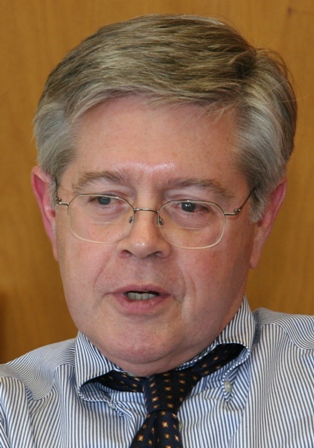 Al:
Could you give my web site readers your message about Calumet
College. Al:
Could you give my web site readers your message about Calumet
College.
Lance: Well, that is always a good topic. First of all, this is a
very unique school. There aren't many schools like Calumet
College in this area of which I am aware. We offer undergraduate
degrees, and now we have added master's degrees. I characterize it
as a "bootstrap" school. It is where people come who are
marginalized and who never thought about going to college. Very
often, they are the first student in their family to attend or
graduate from college. They tend to be older. We have the oldest
average age of a student in Indiana. Currently, the average age is
36. It used to be even higher, because we didn't have a sports
program until about five years ago. When we got into having a
sports team, which really is about recruiting academic students not
recruiting athletes, our average age went down considerably. It was
a very good move for us from a business point of view. It was a
win-win situation. It helps the college progress and do well. It
helps the students get college degrees, which they might not do
otherwise if they weren't able to play sports. We are willing to
field the teams if those kids are willing to come here and go to
school. That has worked for us very well.
Al: To which conference does the college
belong?
Lance: We are in the Chicagoland Athletic Conference and compete
pretty well with the other schools. Actually, most people would not
have heard of them. They are pretty small schools around the
area....Cardinal Stritch, which is in Milwaukee, Moody Bible
Institute, Trinity, Judson College, Purdue Calumet, IUNW, and Purdue
North Central. We play them and are getting a pretty good rivalry
going with some of the local universities even though some are 10
times bigger than we are. We feel we have a very competitive team.
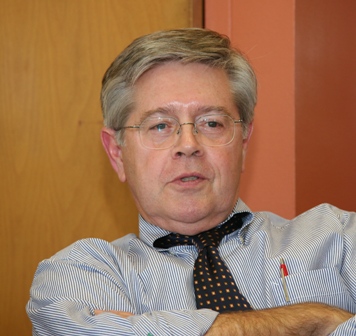 Al:
What is the student population? Al:
What is the student population?
Lance: We have about 1,300. A lot of people are part-time; we have
probably about 1,000 fulltime students. It is a school where people
who have decided to take action to improve their lives can come and
get a good education. Hopefully, they will live up to the
aspirations they have set for themselves. We give people a lot of
personal attention with a lot of counseling, tutoring, and help.
Many of our students come here underprepared academically, and they
typically don't have atmospheric SAT scores. We have a fairly open
admission policy; however, we do turn people down once in a while.
If people want to come and try, we will help them and give them a
chance. We are not about the business of dealing with SAT scores.
Frankly, we like to contrast ourselves with places like Notre Dame
or Wabash where SAT scores are a real big part of whether or not you
get in. That is not the case here. We are here to make life better
for more people. What you see with most schools is that the best
and the brightest are getting the best stuff. I don't know how we
level the playing field so that people who aren't necessarily, at
the moment, the best and the brightest. We want to work with people
who want to be responsible for themselves and want to do better, who
aspire to a better life. We want to give them a chance. I just
don't think they are getting enough chances in the world.
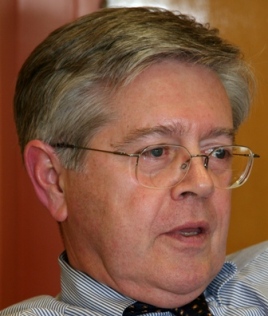 Al:
It is interesting to listen to you about Calumet's mission. What
you said about global societies parallels what you are saying about
your college students. The rich
schools perpetuate richness just like our society perpetuates
our richness. Al:
It is interesting to listen to you about Calumet's mission. What
you said about global societies parallels what you are saying about
your college students. The rich
schools perpetuate richness just like our society perpetuates
our richness.
Lance: It is interesting. How do you change that? My wife and I
talk about this, and I think our view is that if Jesus Christ came
back, if there was a second coming, he would get crucified again
because he would be too much of a rebel. People would not like the
message this time either. It is frustrating. I always think I am
not doing enough. I don't speak out enough or take enough action.
I could be doing a lot more for sure. I guess you do what you can
do.
We heard a presentation here on Martin Luther King's birthday by
Richard Morrisroe, one of our instructors here. He is an attorney
and, at one time, was a priest. He was down in Alabama in '65-66 as a
priest with the civil rights workers. He got shot in the back and
his colleague, studying to be an Episcopal priest, was killed at
that same time. Dick was with him, saw him killed, and the shooter
gets off Scotfree. He is a guy who is willing to put his life on
the line. I have never done that, and I don't know that I would
have had the courage to do what he did. I just wish that I was
seeing it getting better, but I'm not.
Al: I don't see things changing much
either. What is the diversity situation at Calumet College?
Lance: Diversity. It's interesting that you should mention that.
One of the reasons I like living around here is because of the
diversity. That is one thing I should have mentioned about this
college; we actually have the highest number of minority students
both African-American and Hispanic of any college in the state.
We look more like the region than any other local college. We are
more diverse than any other college in Indiana. US News and World
Report rates us as the most diverse college in the Midwest based on
our student body. We are pretty proud of that and, again, it
reflects marginalized people having a chance to get a leg up.
Al: Whites, also, can learn from
diversity.
Lance: Yes, that is the other part of it. What I find pretty
interesting, and I don't know why it is, but it is typical of human
beings. We stereotype other human beings. I don't care who they
are. I remember when I would be riding in our car with my folks and
all of a sudden someone would go roaring by us. If the car had an
Illinois plate, my parents would say, "Oh those crazy Illinois
drivers...." I used to live a block away from the state line in
Hammond, IN. On just the other side of the street, people lived in
Illinois. It struck me as odd that the people across the state line
were "different" than us. Come on. That's really goofy. It is
pretty easy for a human being to stereotype people, especially when
they look different. I think it is hard to get people to understand
that it is better to celebrate differences than to back away from
them. I don't know how you will ever solve that other than saying,
"let's celebrate our diversity."
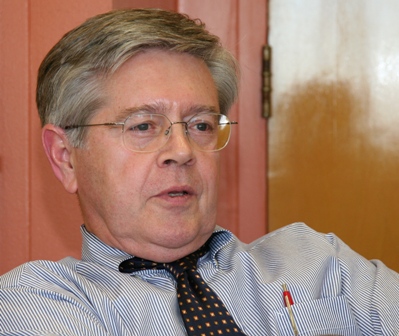 Al: I would like to wrap this up
with a question that Gene Siskel use to use in his interviews. When
he was still alive would always ask his interviewees about movies
that they liked. He thought their answer would reveal something
about them. Give me one or two movies that you liked.
Al: I would like to wrap this up
with a question that Gene Siskel use to use in his interviews. When
he was still alive would always ask his interviewees about movies
that they liked. He thought their answer would reveal something
about them. Give me one or two movies that you liked.
Lance: I could probably name a whole bunch of them!
Al: Name a couple.
Lance: I like Lawrence of Arabia, I was blown away by the visual
power of that film. I like The Bridge on the River Kwai maybe for the
same reason.
Al: Why did you like Lawrence of Arabia?
Lance: Ummm...it's British! That is in its favor, to start with.
When I saw the film, I didn't know anything about the person, but I
thought the guy was quite an adventurer. I thought about reading
more about it. Whatever he did was pretty remarkable.
Oh, he was trying to help some other people, sacrificing his
health, safety, and career for people. He was trying to help the
Arab people because he felt that they had been mistreated and
misunderstood. I do like those kinds of stories. There
are more than their own lives that they are worried about. They are concerned
about others, and I guess that is an attraction.
Al: One last thing, if you had the
opportunity to write your epitaph, what would it be.
Lance: Something like, "He never gave up; he kept trying."
|






